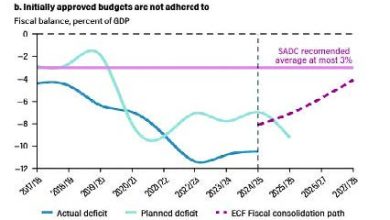World bank outlines ways to control prices
The World Bank says Malawi is experiencing a severe inflation crisis with prices escalating rapidly and has since recommended a dual approach to deal with the situation.
Among other measures, the Bretton Woods institution has suggested mitigating supply-side constraints and controlling the growth of money supply.
In its latest Malawi Economic Monitor, a biannual report series, released yesterday in Lilongwe, the bank observes that supply-side constraints, particularly in the agriculture sector, are putting pressure on inflation.

Inflation rate peaked at 35 percent in January this year before moderating to 33.6 percent in June, the highest in 11 years.
Food inflation, which dropped from a peak of 44.9 percent in January this year to 41.5 percent in June, according to data from the National Statistical Office, will continue to exert pressure on prices in the short to medium-term.
The World Bank has also cautioned that the rapid growth of money supply has the potential to worsen inflationary pressures in the short to medium-term.
Reads the report in part: “The growth of money supply remained elevated at 47 percent year-on-year in April driven by central-bank financing of the fiscal deficit.
“Further monetary financing of the deficit could intensify inflationary pressures and the recent drought could cause a supply shock that increases food prices, especially for staples like maize.”
The money supply growth stood at 12.4 percent of the country’s gross domestic product (GDP) in the 2023/24 financial year, according to the World Bank, adding that the current trajectory make Malawi become the country with the highest deficit in southern Africa.

“Moreover, the approved budget for the 2024/25 financial year rests on optimistic revenue assumptions and revenue underperformance may necessitate further borrowing, which could undermine monetary policy efforts,” further reads the report in part.
The World Bank’s assertions come at a time the Reserve Bank of Malawi’s tight monetary policy has largely been ineffective to containing inflation, according to analysts.
It also comes at a time the RBM Monetary Policy Committee is meeting to deliberate on the economic performance and decide on the direction of the policy rate currently at 26 percent.
Since 2020 when the RBM kept interest rate low to contain the economic fallout caused by the Covid-19 pandemic, the central bank raised the policy rate by 1 400 basis points from 12 percent to 26 percent, yet inflation remains above 30 percent, nearly six times above the desired five percent mark.
Speaking in interviews yesterday, Economics Association of Malawi acting president Bertha Bangara-Chikadza and Catholic University of Malawi economics lecturer Derrick Thomo agreed that money supply growth would worsen the inflationary pressures.
Said Bangara-Chikadza: “High money supply exerts inflationary pressure on both the demand and supply sides.
“With more money in circulation, prices tend to rise as demand for goods and services increases. If supply does not increase to similar levels, prices will rise, resulting in demand-pull inflation.”
Presenting the report yesterday, World Bank country economist Jacob Engels said government has to address the food supply issues through timely purchases of grain through the country’s strategic reserves or imports.
But Bangara-Chikadza said the World Bank’s view sounds theoretical, cautioning that the success of the suggested measures could depend on other factors specific to the Malawi economy, including exogenous shocks which affect the country’s agriculture sector.
On his part, Thomo said the approach has a high probability of success because addressing supply side factors can ease shortages and controlling money supply growth can manage demand-pull inflation.
“However, its success is highly reliant on proper implementation and government management amid external pressures,” he said.
Commenting on addressing the supply-side issues, Mwapata Institute executive director William Chadza emphasised the need to boost productivity in the agriculture sector by promoting irrigation to mitigate climate shocks and improving soil health through integrated soil fertility management.
“We should also revamp our extension service. We should reduce the farmer-to-extension worker ratio from 2 017 to 1 to at least 1 000 to 1 or lower as outlined in the National Agriculture Policy and National Agriculture Investment Plan,” he said.
RBM spokesperson Mark Lungu could not be reached fyesterday to comment on the World Bank’s suggestions.
But in an earlier interview, he said monetary authorities have no choice, but to keep interest rates high because “if we let inflation run away, then we will not have stability”.





